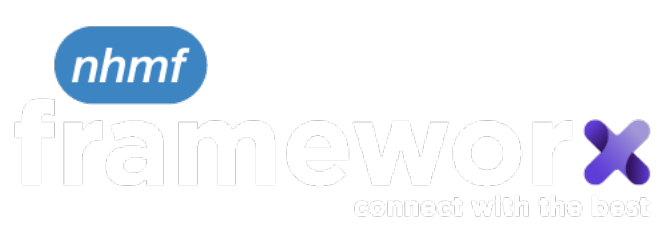One of the main reasons I joined NHMF Frameworx as Head of Frameworx earlier is this year is the ethos behind the brand. A not-for-profit status (which isn’t unusual) and a commitment to making a difference. We are determined to offer choice and value to clients through our range of agreements and established network of approved providers, managed by procurement professionals for a modest maximum fee of 1.5%. And, most importantly, a promise that all surpluses are invested back into social value, sustainability, innovation, research and training. I could immediately see the potential to build on the great work the team has already done – 98 live contracts and over £330m works procured in just 3 years. When Frameworx generates surplus revenue, it’s important that money returns to members to support social value. But what matters most is that that social value is meaningful.
Social value has been a driving passion of mine since I began my career in the public sector over 15 years ago. It’s what truly excites me — helping clients create genuine, measurable, and lasting social impact. The new Procurement Act has given social value a much-needed boost, strengthening the requirements for KPIs, transparency, and reporting across public sector contracts. Yet, despite this progress, it’s easy for the sector to lose sight of what social value really means — and what it can genuinely achieve for communities.
More than a tick box exercise
A common problem I see is that organisations often aim too broadly. When social value targets an entire city or county, the impact becomes diluted. If you really design and track social value properly, the impact can be positive and meaningful to the community where works are being carried out. For example, if you’re looking for apprentices, every community is going to have young people in it so go and talk to the young people in the area and find out if anyone wants to be an apprentice.
You can paint all the fences in a town – 4,500 people don’t really notice it, and 500 people either like it or don’t. Whereas if you design your social value to really help a specific group of people, you can do so much more. We have the power to be community focused and design some really clever social value just to impact the people who live in the community where work is being delivered.
What is Meaningful Social Value?
Meaningful social value can be anything from improving education and skills to increasing employment opportunities in an area, lifting people out of food or energy poverty, to improving environmental metrics. The key thing is that it’s about creating lasting change.
It means finding out what a specific community actually needs, designing initiatives around those genuine needs, and ensuring they have longevity beyond the initial contract period.
True meaningful social value is properly tracked, properly designed, and tailored to authentic community requirements. It’s about depth of impact rather than breadth of coverage, and genuinely improving the economic, social, and environmental wellbeing of the areas we serve.
A common issue I see is that procurement exercises often rely on broad, generic social value questions that bidders struggle to interpret — resulting in vague, tick-box responses. By being specific to what a community actually needs, social value can be meaningful from the very start.
Social value doesn’t have to be defined entirely within the tender. Some of the most powerful outcomes I’ve seen have come when the buyer asks bidders how they would tackle local social challenges — then works with the successful supplier to co-design the offer, set measurable KPIs, and embed delivery within the contract.
We must remember that the value in social value isn’t measured by the size of a cheque. It’s about the difference made — to individuals, to communities, and to organisations working together. True value comes when one life is changed for the better. We don’t need to solve every problem at once; lasting, local change adds up to transformational impact across our communities.
Echoed by the sector
I attended the NHMF Service Provider meeting recently and heard a compelling discussion between Christopher Harrison (Housing Ombudsman Service), Bali Kaur Nahal (Estuary Housing Association), Nik Bliss (Stop Social Housing Stigma) and Pam Hankinson (Stop Social Housing Stigma). While the session was focused on Respecting Residents, the conversation turned to social value and very much echoed the need for social value to be resident-led. It’s only by talking and listening to residents and by treating them as individuals, that we can truly deliver something that has lasting community impact.
Championing social value
We’re making it our mission to celebrate good social value, both in the contracts procured in our network and in the sector as a whole.
We recently sponsored the Best Social Value Project category at the inaugural Housing Executive awards, to which Karbon Homes were the worthy winner for their social value projects and initiatives, which delivered an incredible £2.8m of activity last year and through their partnership with the Greggs Foundation, they’ve funded breakfast clubs in 11 primary schools across the North East.
We’re also introducing a new social value category at the NHMF Maintenance Conference and Awards in January.
The ‘Frameworx – Social Value Project Award’ is open to Housing Providers that have procured through Frameworx to nominate an initiative, either existing or planned, that gives real impact in the local community. It could be a food bank, training programme, Community café, or repair & decorative work on a specific location, for example. We’re looking to support initiatives that are meaningful and will make a difference in the local community with a donation from our Social Value Fund.
The winning project will receive a donation of £7,000 and we’re also offering a Highly Commended spot that will receive a donation of £3,000. NHMF Frameworx team will also offer support to deliver the project and work with our large supply chain to further boost the support and delivery.

